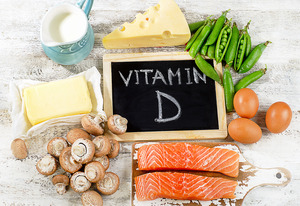
Are you getting dental implants to replace your missing teeth from the roots up? If so, you probably want to do everything you can to ensure that your chances of success are as high as possible. Among the many steps you can take, one of the less obvious ones is making sure that you’re getting plenty of vitamin D. Your periodontist is here to explain why vitamin D is important to the dental implant process and how you can get more of it.
What Happens After Dental Implants Are Placed?
A major part of the dental implant process is a natural phenomenon called osseointegration. Simply put, the bone in your jaw will gradually form a strong bond with the implant posts. Once osseointegration is complete, the implants will be anchored firmly in place in your jaw, allowing them to act as artificial tooth roots. Without osseointegration, your dental implants would fail.
How Does Vitamin D Play a Role?
Osseointegration relies on the growth of new bone tissue, which requires calcium and phosphorus. This is where getting plenty of vitamin D is critical; it helps your body successfully absorb calcium and phosphorus so that it can make use of them. Sufficient levels of vitamin D are therefore necessary for making sure that your body is able to create the bone tissue needed to bond with the implant posts.
Additionally, vitamin D can reduce your risk of gum disease. This is because it has antimicrobial properties that allow it to fight the bacteria that cause oral infections – which is significant because the leading cause of dental implant failure is an infection known as peri-implantitis.
How Can You Make Sure That You’re Getting Enough Vitamin D?
One way to get the vitamin D needed to keep osseointegration on track is to simply spend more time in the sun. This encourages your body to convert cholesterol into vitamin D. Generally speaking, you should try to spend about 20 minutes outside in the sun every day. Of course, you need to be very mindful of exactly how much sun exposure you’re getting; you don’t want to end up suffering from sunburn.
When it comes to foods that contain vitamin D, fatty fish and dairy products are often good choices. Ask your periodontist to see if they have any suggestions for foods rich in vitamin D that you’ll be able to eat while waiting for your mouth to heal after dental implant placement.
By getting plenty of vitamin D, you can lower the odds of problems occurring during the dental implant process. If you would like to learn more about other factors that can influence dental implant success rates, let your periodontist know.
About the Author
Dr. David Handsman is a Diplomate of the American Board of Periodontology, and he currently serves as a faculty study club member and study club leader for Spear Education. His Worcester practice, Handsman & Haddad Periodontics, utilizes the latest technology for precisely placing dental implants. To schedule a consultation with Dr. Handsman, visit his website or call (508) 753-5444.

